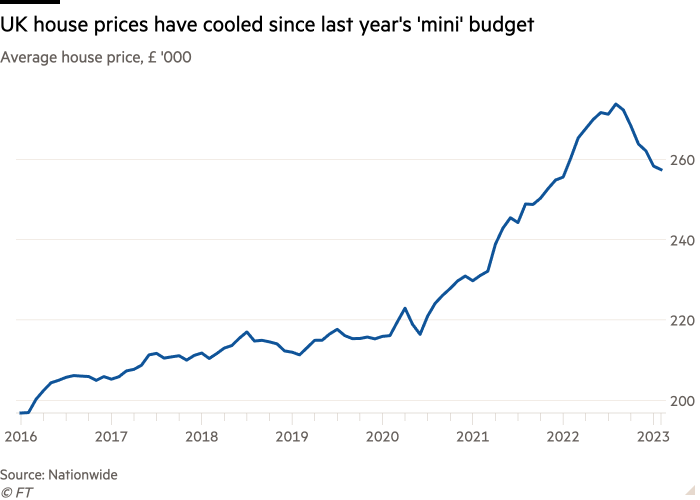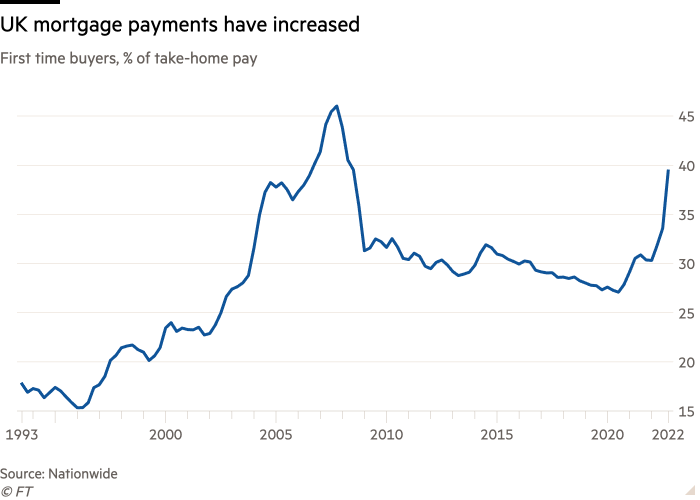[ad_1]
Regardless of frigid climate and a heavy snowfall in Salisbury in south-west England this week, property agent Chris Husson-Martin is at work by 7am. “Nothing stops,” he mentioned, including that regardless of the snow “we solely had one cancellation”.
Like different property brokers throughout the nation, he’s working time beyond regulation to restore harm to the housing market inflicted by Liz Truss’s September “mini” Finances, which sparked a sudden bounce in mortgage charges to about 6 per cent that Husson-Martin mentioned “very a lot freaked folks out”.
“We had offers that fell off the bed as a result of folks couldn’t afford them anymore,” he recalled. However after mortgage charges steadied at about 4 per cent a number of the failed purchases have began to come back good — albeit at decrease costs. “We re-agreed two of them [with] the unique patrons,” he mentioned.
The reductions mark a significant shift after greater than two years of superheated home costs inspired by very low borrowing prices and authorities incentives which have now come to an finish.
The worth reductions are amongst numerous indicators that the UK housing market is cooling. In January, mortgage approvals dropped to their lowest ranges since Might 2020, when the market was largely shut due to a Covid-19 lockdown. Excluding the pandemic, approvals had been at their lowest since 2009.
Separate information printed this month by mortgage supplier Nationwide confirmed that common home costs declined to £257,400 in February, from a peak of £273,800 in August 2022. The most recent out there land registry information exhibits they dropped by 0.4 per cent between November and December.

“I think that patrons’ expectations of what a home is value are resetting,” mentioned Tomasz Wieladek, chief European economist at asset supervisor T Rowe Value. He expects home costs to say no between 10 and 15 per cent from their peak and predicts that the market will see “a battle of attrition,” between patrons and sellers that “patrons will finally win”.
An influential survey by the Royal Establishment of Chartered Surveyors printed this week revealed that 60-70 per cent of properties offered for lower than their asking value final month. It additionally discovered that greater borrowing prices and inflation are squeezing budgets and dampening demand, which has been declining for 10 consecutive months.
The typical low cost to asking value throughout the UK in February was 4.5 per cent, in response to Zoopla, the property portal. However brokers say the market is fragmented, with reductions out there for some varieties of housing, reminiscent of flats, however little or no provide of in-demand properties, like household houses. The RICS survey reported the inventory of residential properties on the market is near its lowest degree since information started in 1978.
“It’s a actual shortage concern that’s holding costs fairly robust for household houses,” mentioned Sophie Sharman, head of gross sales at Hamptons in Balham, south London. She added that patrons searching for a house costing about £1.5mn in her space final 12 months “can be seeing 20 homes on a Saturday” however now they’re “perhaps seeing two or three viable choices”.
Brokers say the scarcity of residential properties could mirror potential sellers ready for a extra buoyant market. “Most individuals don’t want to maneuver or must promote. As we present in 2008, reasonably than settle for a low value they only . . . attempt once more in a 12 months’s time,” mentioned Matthew Leonard, director at Winkworth in Tub. “It’s a determined scarcity of property and a few very, very pissed off patrons.”
Nevertheless, some good offers could be present in less-favoured elements of the market, significantly flats, the place first-time patrons are a key a part of demand. “First time patrons gas that market. They’re simply so nervous,” mentioned Sharman. “They don’t seem to be getting the mortgage deal that they need, so they’re nearly asking the vendor to make up the distinction with the value.”

These patrons are getting into a market with traditionally excessive home costs, which boomed throughout the pandemic. Regardless of the latest decline, the common home value continues to be £41,000 greater than in February 2020, simply earlier than the primary Covid-19 restrictions had been imposed, in response to Nationwide. By comparability, costs grew by solely £10,000 within the three years to February 2020.
Consequently Nationwide discovered that first-time patrons’ mortgage funds have risen to 39 per cent of take-home pay, the very best proportion since 2008.
Some analysts predict patrons will modify to these greater borrowing prices and demand will return.
“Whereas there are plenty of headlines about costs coming down, they’re mainly simply coming again to actuality after years of a Covid loopy market,” mentioned Leonard.
[ad_2]
Source link

